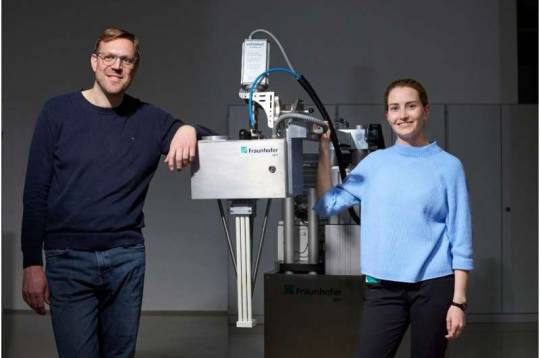#Materials Testing
Explore tagged Tumblr posts
Text

Ultrasound reliably detects inclusions in aluminum production
Large, hard-to-access equipment and high temperatures: Foundries are home to extreme conditions. Working with liquid metal requires flexibility and resilience in humans and machines alike. With an eye to this challenging environment, a team of researchers from Fraunhofer IZFP was tasked with developing a new measuring system for customers from the aluminum industry to detect contamination in molten metal—an important tool during the production process. Contaminants as safety risk "The purity of the molten metal, whose temperature ranges from 600 to 800 degrees Celsius, is hugely important to the final product later on. For example, any ceramic particles that may be present in the melt don't liquefy until they get to a temperature of 2,000 degrees or more, and they remain in the finished component as inclusions if they aren't deliberately removed.
Read more.
#Materials Science#Science#Ultrasound#Aluminum#Defects#Materials testing#Liquid metal#Ceramics#Inclusions
13 notes
·
View notes
Text
Raw Materials Testing in Abu Dhabi: Meeting Local and GCC Standards | +971 554747210
Abu Dhabi is a pivotal hub for manufacturing, construction, pharmaceuticals, food processing, and more in the Gulf Cooperation Council (GCC) region. To maintain the highest levels of product quality and safety, industries rely heavily on raw materials testing to ensure compliance with local and GCC standards. This testing is a critical part of the supply chain that guarantees the materials used meet the stringent requirements set forth by regulatory bodies.
In this blog, we will explore how raw materials testing in Abu Dhabi supports industries in achieving compliance with local and GCC standards, the significance of such compliance, and how accredited laboratories play a vital role in this ecosystem.
Understanding Raw Materials Testing
Raw materials testing refers to the process of analyzing materials before they are used in production. This includes physical, chemical, and microbiological testing to verify the quality, purity, composition, and safety of the materials. The goal is to ensure that raw inputs conform to the relevant standards and regulations, preventing defective or hazardous materials from entering the manufacturing process.
Raw materials testing is crucial for industries including construction, pharmaceuticals, food and beverage, cosmetics, and electronics—sectors that form the backbone of Abu Dhabi's industrial economy.
Local and GCC Standards Governing Raw Materials Testing
1. Abu Dhabi Local Standards
At the local level, Abu Dhabi follows regulations and guidelines issued by various authorities including:
Abu Dhabi Quality and Conformity Council (QCC): Sets quality assurance policies and ensures conformity with national and regional standards.
Department of Municipalities and Transport (DMT): Regulates construction material testing and infrastructure quality.
Dubai Municipality (in close coordination for UAE-wide standards): Oversees food safety, pharmaceuticals, and building materials compliance.
These entities mandate rigorous testing protocols that raw materials must meet before use in any production or construction.
2. GCC Standards and Regulations
The Gulf Cooperation Council (GCC), comprising Saudi Arabia, UAE, Kuwait, Bahrain, Oman, and Qatar, has harmonized many standards to facilitate trade and ensure product safety across member countries.
GSO (Gulf Standards Organization): Develops technical regulations and standards applicable to products and raw materials used in the GCC.
GCC Conformity Mark (G Mark): A certification indicating products or materials meet GCC technical regulations.
GCC Standardization and Metrology Authority: Oversees calibration and standardization for testing labs in member states.
Compliance with GCC standards ensures that raw materials can be used or exported freely within the region, fostering economic integration.
Importance of Meeting Local and GCC Standards in Raw Materials Testing
Ensuring Product Quality and Safety
Raw materials are the foundation of any manufactured product. Testing to local and GCC standards guarantees that these inputs do not compromise the safety or functionality of the final products. For instance, construction aggregates tested per ASTM and GSO standards assure structural safety, while pharmaceutical raw materials must meet purity requirements to ensure drug safety.
Facilitating Trade and Market Access
Meeting GCC standards streamlines cross-border trade within the Gulf region. Raw materials tested and certified compliant reduce the risk of shipment rejections or delays, helping businesses maintain supply chain continuity and tap into regional markets more efficiently.
Regulatory Compliance and Avoiding Penalties
Failure to comply with local and GCC testing standards can result in hefty fines, import restrictions, or product recalls. For companies operating in Abu Dhabi, demonstrating compliance through certified raw materials testing is essential to avoid legal complications and sustain operations.
Supporting Sustainable Development
Both Abu Dhabi and the GCC prioritize sustainable growth. Raw materials testing includes assessments for environmental safety, such as checking for hazardous substances or recyclability, which align with green building certifications like Estidama and LEED.
Types of Raw Materials Tested in Abu Dhabi and GCC
The range of raw materials tested spans various industries, including:
Industry
Raw Materials
Common Tests
Construction
Cement, aggregates, steel, concrete, water
Compressive strength, chemical composition, durability
Pharmaceuticals
Active pharmaceutical ingredients (APIs), excipients
Purity, potency, microbiological contamination
Food & Beverage
Raw ingredients, additives, packaging materials
Microbiological load, chemical residues, allergens
Cosmetics
Base oils, preservatives, fragrances
Heavy metals, microbial contamination, chemical purity
Electronics
Metals, plastics, semiconductors
RoHS compliance, electrical conductivity, chemical content
Role of Accredited Laboratories in Abu Dhabi
Abu Dhabi hosts several ISO/IEC 17025-accredited laboratories equipped to carry out comprehensive raw materials testing aligned with local and GCC requirements.
Why Accreditation Matters
Accuracy and Reliability: Accredited labs follow validated methods ensuring precise, reproducible results.
Regulatory Acceptance: Certificates issued by accredited labs are recognized by authorities like QCC and GCC bodies.
Global Credibility: Accreditation aligns with international standards, supporting export and cross-border trade.
Labs such as METS Lab, Intertek, and DCL Abu Dhabi are among the prominent service providers offering tailored raw materials testing solutions for different sectors.
How Raw Materials Testing Works: The Process
Sample Collection: Representative samples are collected following standard protocols to ensure testing relevance.
Testing & Analysis: Laboratories employ chemical, physical, and microbiological tests based on applicable standards (GSO, ASTM, ISO).
Reporting: Detailed reports with test results, certificates of conformity, and compliance statements are prepared.
Certification: Where required, labs assist with issuing certificates to facilitate customs clearance and regulatory approvals.
Challenges and Solutions in Raw Materials Testing in Abu Dhabi
Challenge: Variability in Raw Material Sources
Raw materials are often sourced from multiple countries, leading to variability in quality. Testing helps mitigate this risk by verifying consistency and compliance before materials enter production.
Challenge: Rapid Regulatory Changes
Abu Dhabi and GCC regulations evolve frequently. Accredited labs stay updated on these changes to help businesses adapt quickly.
Challenge: Time Constraints in Project Timelines
Tight project schedules can delay testing. Many labs now offer expedited testing services without compromising accuracy to keep projects on track.
Conclusion
Raw materials testing in Abu Dhabi is an indispensable part of maintaining product quality, safety, and regulatory compliance in line with both local and GCC standards. It safeguards industries from risks associated with substandard inputs, supports trade facilitation, and contributes to the sustainable growth of the region’s economy.
By partnering with accredited testing laboratories, manufacturers and importers in Abu Dhabi can confidently navigate regulatory frameworks and meet the rigorous standards demanded by today’s markets.
#raw materials testing#materials testing#material testing#material testing lab#testing lab near me#testing lab uae
0 notes
Text
Nearly all of the things that people use today were constructed with them. But it's important to check that the new materials are up to snuff. To accomplish this, it is crucial to test the materials using particular criteria. One of the most effective ways to do this is by using universal testing machine tips.
0 notes
Text
Tumblr Tuesday: Horse Race Tests!
It is a truth universally acknowledged that a horse meme in possession of The Horrors must be in want of some fanart. Move over, horse plinko. The equines of Horse Race Tests have captured everyone's imaginations, and while e1m6t3—the race to end all races—brought things to a close last week, your art and headcanons live on. Better to have raced and (gotten) lost than never to have raced at all. Please enjoy this roundup of Horse Race Tests fanart.
@redgunkonacanvas:

@bocchidaily2025:

@oquitbootz:

@angeban:

@princehibiscuit:

@solarsaturns:

@patchqork:

@razorwirezz:

@supmaww:

@tvheit:

@cabinette:

@sirartwork:

@cl0wnah0lic:

@zihette:

@coochiekrab:

@vulgaroctopus:

@evenbiggerhorse:

@milkape:

@moltworm:

@cellybot:

@radmule:

@zaquarii:

@valiumings:

@werewargs:

#tumblr tuesday#horse race test#hrt#meme art#memes#yuri#horseposting#boygenius#bullet'n'board#comely material morning#cyan#superstitional realism#door knob#downtown skybox#jovial merryment#resolute mind afternoon#yellow#artists on tumblr#long post
3K notes
·
View notes
Text
Unveiling the Secrets of Innovation: The Importance of Materials Testing
In the ever-evolving landscape of technology and manufacturing, the role of materials testing cannot be overstated. From ensuring product reliability to pushing the boundaries of innovation, materials testing serves as the bedrock upon which groundbreaking advancements are built. In this blog, we'll delve into the world of materials testing, exploring its significance and the myriad benefits it offers across various industries.
Ensuring Product Quality and Reliability
Materials testing is a critical component in the quest for producing high-quality and reliable products. Whether it's an aerospace component, a medical device, or a consumer electronic gadget, the structural integrity and performance of materials matter. Rigorous testing methodologies help manufacturers identify potential flaws, weaknesses, or inconsistencies in materials, enabling them to rectify issues before the product reaches the end consumer. This proactive approach not only safeguards the reputation of the brand but also minimizes the risk of product recalls and warranty claims.

Enhancing Safety Standards
In industries where safety is paramount, such as automotive and aerospace, materials testing is a non-negotiable aspect of the production process. From crash tests to fatigue testing, the ability of materials to withstand various stressors is meticulously evaluated. This not only ensures compliance with safety standards and regulations but also contributes to the overall improvement of industry-wide safety benchmarks. In the end, consumers benefit from products that have undergone rigorous testing, providing them with a sense of security and confidence.
Driving Innovation and Performance
Materials testing is not merely about ensuring that products meet minimum standards; it is also a catalyst for innovation. By pushing materials to their limits and understanding their behavior under different conditions, researchers and engineers can unlock new possibilities. This can lead to the development of lighter, stronger, and more durable materials that redefine the capabilities of products across industries. For example, advancements in materials testing have played a crucial role in the evolution of high-performance materials used in everything from sports equipment to cutting-edge medical devices.
Cost-Effective Solutions through Lifecycle Analysis
While some may view materials testing as an additional expense, it is, in fact, a wise investment that pays dividends in the long run. Materials testing allows for a thorough analysis of a product's lifecycle, helping identify potential weak points that could lead to premature failure. By addressing these issues during the design and testing phases, manufacturers can avoid costly recalls and warranty claims down the line.

Environmental Sustainability
In an era where sustainability is a global priority, materials testing can contribute to eco-friendly practices. By evaluating the environmental impact of materials and manufacturing processes, researchers can identify opportunities for improvement. This may involve finding alternative materials with lower environmental footprints or optimizing production methods to reduce waste. Ultimately, materials testing aligns with the growing demand for sustainable practices, allowing industries to create products that are not only efficient and reliable but also environmentally responsible.
0 notes
Text
how it feels being a horse race tests fan

1K notes
·
View notes
Text

even dogs pass the mirror test
#hello again everyone. how's it going#isat loop#in stars and time#isat fanart#in stars and time fanart#isat#lucabyteart#isat spoilers#so. had this idea Before getting my hands on the artbook and being validated. literally have a voice note from 4:30am on the 8th where#i frantically noted down this just horrid horrid horrid caption because i'd been musing on the sasasap Dress line all day i suppose#just kind of rotating in my brain the way any kind of first time trying on new clothes for them would be .#just absolutely mental breakdown material and not one i think would be recovered from quickly. they hate being in their own skin#like. a lot? like a lot. the collateral of any kind of transfemme read was barely in my mind until it ended up relevant again while i was#actively working on this. because christ that's a bad combo. 2x different forms of body dysphoria in one. maybe even 3x somehow#plus any scenario where they get clothes is... likely gifted. something they react viciously negatively to in game and i doubt#would improve thereafter. just a veritable katamari of disgust and self-loathing#like i was mostly just thinking abt how a lot of our collective depictions of loop being alienated from their body are rather abstract#in a body horror way mostly. on account of loop being more of a metaphor than a person half the time. so i think i wanted to depict#something closer to just. a human level of body dysphoria. no focus on the whole duplicate thing just... raw disgust for the self#but with the addition of recent discussion and playing ball more with the she/her loop and transfem loop angle...#scenario of leaning into femininity to try throw off suspicion on who they are PLUS realising they might want that PLUS the party#trying to use this to bond with them PLUS body dysphoria PLUS new!gender dysphoria PLUS the usual revulsion for wanting and desire#like. that is a catastrophic combination . not coming out of that one without it getting worse for a few weeks thereafter#that's a real lash out at everyone around them and then recede in shame type breakdown. which im sure looks interesting from#the party's pov because jesus christ that touched a nerve something awful (<- they only have half the context AT BEST)#. so . there's your free scenario to ponder on if you'd want to. seeing as ive done a picture without a shitload of words on it for once#ALSO don't get smart with me in the tags about the mirror test being an absolutely ass test in most regards re: self-awareness#or that things like minnows pass it. i'm a fellow pedant dont worry. it's just that minnow doesn't really have the same ring as dog yknow?#this is supposed to be like an absolutely excruciatingly self loathing thought spoken aloud of a caption. it's pithy and cruel on purpose#and more than a little inspired by (reblogged yesterday) liminal space's 'there is no other dog. it's just you'
1K notes
·
View notes
Text






Something's wrong with Jovial ...


#horse race tests#thinking so much about todays tournament ....#jovial merryment#or is he .....#fearsome fate#comely material morning#lightning strikes thrice
1K notes
·
View notes
Text





hrts pre-nightmare races
#my art#drawing#fanart#horse race tests#jovial merryment#yellow hrt#cyan hrt#superstitional realism#comely material morning#downtown skybox
1K notes
·
View notes
Text

uhm… horsies :)
#horse race tests#resolute mind afternoon#jovial merryment#lightning strikes thrice#cyan horse race tests#bullet’n board#comely material morning#door knob horse race tests#superstitional realism#downtown skybox#purrs#my art#technically not a game and im late to the party but…. i am kind of obsessed with them. and i am a material girl through and through 🩷🐎#edit may 31 WOW this bload up 😳 im so glad everybody likes my take on the horsies :)
924 notes
·
View notes
Text

Unmasking hazardous compounds in cosmetics, skincare products and perfumes
Four new studies by scientists from Justus Liebig University Giessen (JLU) have shown that lifestyle products contain hazardous compounds that have not been detected by previous tests and are not currently regulated. The researchers used a new analytical methodology to investigate 140 skincare products and cosmetics from 20 product segments as well as more than 40 perfumes. They found hazardous compounds that are mutagenic/genotoxic, cytotoxic, antibacterial, neuromodulatory or neurotoxic, and significantly affect the hormonal balance. A possible detoxification of the hazardous compounds in the body was not evident from a simulated liver metabolism. Their studies were published in the Journal of Chromatography A and Analytica Chimica Acta.
Read more.
10 notes
·
View notes
Text
Understanding Local Compliance for Raw Materials Testing in Dubai | +971 554747210
Raw materials are the foundation of any product, whether it’s a building, a pharmaceutical drug, or a consumer good. In Dubai, a city renowned for its rapid development, innovation, and global trade, ensuring the quality and compliance of raw materials is essential. That’s where raw materials testing plays a vital role. This blog explores the importance of understanding local compliance for raw materials testing in Dubai, especially for manufacturers, importers, and construction firms.
What is Raw Materials Testing?
Raw materials testing is the process of analyzing the physical, chemical, and sometimes biological properties of materials before they are used in manufacturing or construction. These tests help determine whether a material meets the necessary specifications, performance standards, and safety requirements.
In Dubai, raw materials tested often include:
Cement, sand, gravel, and steel for construction
Active pharmaceutical ingredients (APIs)
Food-grade raw materials
Polymers and plastics
Metals and alloys
Why Local Compliance Matters in Dubai
Dubai operates under a well-established regulatory framework designed to protect consumers, maintain public safety, and ensure environmental sustainability. Companies involved in manufacturing, construction, or trade must comply with local regulations governing raw materials testing to avoid legal issues, fines, or market rejection.
Key reasons why compliance is critical:
Safety Assurance: Substandard raw materials can result in unsafe products or infrastructure.
Regulatory Approval: Authorities like Dubai Municipality and Emirates Authority for Standardization and Metrology (ESMA) mandate testing for specific materials.
International Trade Readiness: Dubai serves as a hub for global trade, and compliance with local standards ensures smoother export and import processes.
Quality Control: Regular testing ensures consistent product performance and quality.
Regulatory Bodies Overseeing Raw Materials Testing in Dubai
Several government agencies are responsible for enforcing and monitoring raw materials testing and compliance in the UAE and Dubai specifically:
1. Dubai Municipality
Dubai Municipality is one of the key regulators. It ensures that construction materials, water, and other industrial raw materials meet health and safety standards. It often mandates testing through approved and accredited laboratories.
2. Emirates Authority for Standardization and Metrology (ESMA)
ESMA is the federal body responsible for developing and enforcing national standards. It plays a significant role in the approval of consumer goods, food products, and industrial materials.
3. Dubai Central Laboratory (DCL)
A division of Dubai Municipality, DCL provides testing and certification services and oversees compliance for building and construction materials.
4. Ministry of Industry and Advanced Technology (MoIAT)
MoIAT oversees industrial testing requirements for manufacturing and ensures that materials used in production meet national and international standards.
Common Standards Applied in Dubai for Raw Materials Testing
Dubai relies on both international and UAE-specific standards for raw materials testing. These include:
UAE.S (Emirati standards): Developed by ESMA to cater to regional needs.
ISO/IEC standards: For general material testing, especially in pharmaceuticals and food.
ASTM standards: Widely used in construction material testing.
BS (British Standards): Often applied in the construction sector.
GSO standards: Gulf Cooperation Council (GCC) regional standards applied to traded goods.
Understanding which standards apply to your industry is critical for achieving compliance.
Industries That Require Raw Materials Testing in Dubai
Construction Industry
Testing of cement, aggregates, water, bitumen, and steel is mandatory.
Compliance is essential for building permits and municipal approvals.
Pharmaceutical Industry
APIs and excipients must be tested for purity, microbial content, and chemical consistency.
Labs must be ISO 17025 accredited for pharmaceutical testing.
Food & Beverage Industry
Raw ingredients must be tested for contaminants, nutritional content, and compliance with UAE.S standards.
Halal testing may also be required.
Automotive & Aerospace
Materials like rubber, plastic, and metals undergo stress and durability testing.
Cosmetics and Personal Care
Raw materials must be tested for heavy metals, microbial contamination, and allergens.
How to Ensure Compliance in Raw Materials Testing
To comply with Dubai’s testing regulations, businesses should follow these best practices:
1. Choose an Accredited Testing Lab
Ensure your testing lab is accredited by a recognized body such as EIAC (Emirates International Accreditation Center) or meets ISO/IEC 17025 requirements.
2. Understand Applicable Regulations
Identify the local and international standards relevant to your raw materials. Consult Dubai Municipality or ESMA for up-to-date requirements.
3. Maintain Proper Documentation
Retain test reports, Certificates of Analysis (COAs), and calibration records for audits and inspections.
4. Conduct Regular Testing
Don’t rely on one-time testing. Periodic verification is essential, especially when sourcing from different suppliers.
5. Engage in Pre-Import Testing
If you are importing raw materials, conduct pre-shipment testing to avoid delays at ports and ensure faster customs clearance.
Benefits of Complying with Raw Materials Testing Regulations
Risk Reduction: Identify defective materials before production or construction.
Market Access: Gain approval for local and international markets more easily.
Consumer Trust: Deliver safe and reliable products that meet quality expectations.
Legal Protection: Avoid penalties, fines, or business shutdowns due to non-compliance.
Challenges Faced by Businesses
While compliance is critical, businesses may face some challenges, including:
Evolving standards and regulations
Lack of awareness about applicable testing requirements
Difficulty in finding accredited local labs for niche testing needs
Cost of frequent testing
However, these challenges can be mitigated by working with experienced testing consultants and staying up to date with regulatory announcements.
Final Thoughts
Raw materials testing in Dubai is not just a regulatory formality — it’s a cornerstone of quality, safety, and credibility. As the emirate continues to expand its infrastructure and industrial capabilities, compliance with local testing standards becomes even more crucial.
Whether you're a builder, manufacturer, or importer, understanding the regulatory landscape and partnering with a certified testing lab can save you time, money, and reputational damage. Make raw materials testing a priority to ensure your operations align with Dubai’s commitment to excellence and safety.
#raw materials testing#raw materials testing lab#testing lab near me#testing lab uae#materials testing
0 notes
Text

I heart HRT
#artists on tumblr#art#digital art#my art#hrt#horse race tests#jovial merryment#bullet’n board#door knob#cyan horse race tests#cyan hrt#lightning strikes thrice#downtown skybox#resolute mind afternoon#comely material morning#superstitional realism#procreate#to me. the races are all run by the green horse who is seeking a new vessel to inhabit#its looking for the fastest and strongest horse to take over which ends up being Jovial Merryment (Fearsome Fate)#losing horses are tuned into Nightmare horses (like Super being turned to Fantasy Fantasy Fantasy and Cyan being turned into Oob)#so really. being number one isnt a good thing
680 notes
·
View notes
Text
Comely material when the prize ain't apples

#i love you comely. you know what you want out of life and wont settle for less#horse race tests#comely material morning
548 notes
·
View notes